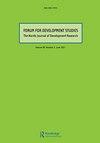In the Making and Unmaking of Statehood. An Exploration of how the State and Petroleum Corporations Negotiate over the Generation of Socio-economic Development in Tanzania
IF 1.1
Q3 DEVELOPMENT STUDIES
引用次数: 1
Abstract
Abstract This article explores how the state and transnational oil and gas corporations negotiate over socio-economic development in Tanzania. It focuses on how public–private and local–global boundaries are in constant reconfiguration between the actors. The article responds to two shortcomings in previous literature on corporate social responsibility, governments and development. First, state agency and power in the global South have been overlooked when the prevailing focus of research has been on community–business relations. Secondly, when states have been addressed, they have commonly been understood either as deviations from a Weberian, ‘modern’ state or as allied with corporate interests. This article departs from these approaches and analyses state–business relations through a focus on discourses and practices that make and unmake statehood. Building on the ‘negotiating statehood’ framework, the analysis focuses on the actors, repertoires, resources and modes of governance in the negotiation over development. The analysis shows how corporate-driven development becomes deeply entangled in the making of statehood, even if the corporate approach revolves around unmaking and improving statehood.国家地位的形成与瓦解。探索坦桑尼亚国家和石油公司如何就产生社会经济发展进行谈判
本文探讨了坦桑尼亚国家和跨国石油和天然气公司如何就社会经济发展进行谈判。它关注的是公共-私人和局部-全球边界如何在参与者之间不断重新配置。本文弥补了以往文献中关于企业社会责任、政府与发展的两个不足。首先,当研究的主要焦点是社区-商业关系时,国家机构和权力在全球南方国家被忽视了。其次,当谈到国家时,它们通常被理解为偏离韦伯的“现代”国家或与企业利益结盟。本文从这些方法出发,通过关注建立和破坏国家地位的话语和实践来分析国家与企业的关系。在“谈判国家”框架的基础上,分析侧重于发展谈判中的行动者、手段、资源和治理模式。分析表明,企业驱动的发展如何与国家地位的形成深深纠缠在一起,即使企业的方法围绕着破坏和改善国家地位展开。
本文章由计算机程序翻译,如有差异,请以英文原文为准。
求助全文
约1分钟内获得全文
求助全文
来源期刊

FORUM FOR DEVELOPMENT STUDIES
DEVELOPMENT STUDIES-
CiteScore
1.80
自引率
14.30%
发文量
24
期刊介绍:
Forum for Development Studies was established in 1974, and soon became the leading Norwegian journal for development research. While this position has been consolidated, Forum has gradually become an international journal, with its main constituency in the Nordic countries. The journal is owned by the Norwegian Institute of International Affairs (NUPI) and the Norwegian Association for Development Research. Forum aims to be a platform for development research broadly defined – including the social sciences, economics, history and law. All articles are double-blind peer-reviewed. In order to maintain the journal as a meeting place for different disciplines, we encourage authors to communicate across disciplinary boundaries. Contributions that limit the use of exclusive terminology and frame the questions explored in ways that are accessible to the whole range of the Journal''s readership will be given priority.
 求助内容:
求助内容: 应助结果提醒方式:
应助结果提醒方式:


